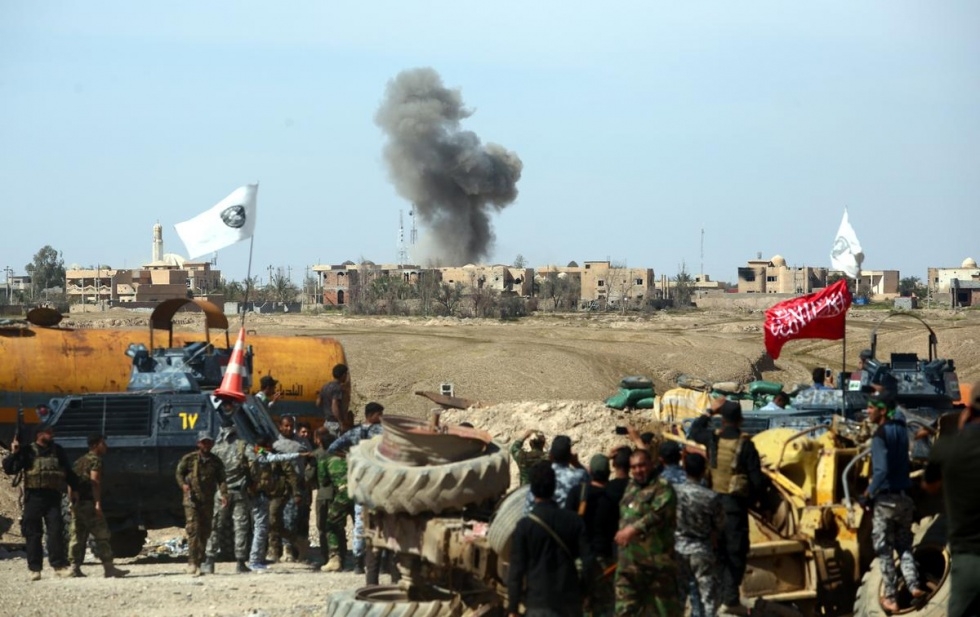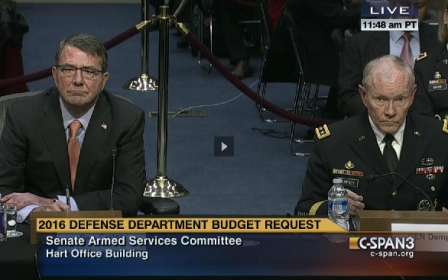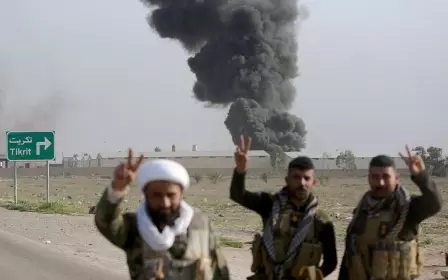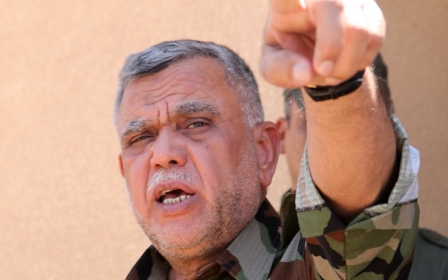Conflicting reports on Tikrit 'liberation' after month-long battle

Hours after the Iraqi prime minister announced the 'liberation' of Tikrit on Tuesday, US officials said Islamic State group still control parts of the city.
"Parts of the city remain under (IS's) control and there is still work to be done," Major Kim Michelsen, spokesperson for the US military command in the conflict against IS, told AFP by email.
Earlier in the day, Iraqi Prime Minister Haider al-Abadi hailed the "liberation of Iraq" on Twitter, congratulating Iraqi security forces and paramilitary forces, dominated by Iranian-based Shiite militias, on their "historic milestone".
Abadi's spokesman Rafid Jaboori told reported that Iraqi forces had reached the centre of Tikrit, raised the Iraqi flag and were clearing the city.
Tikrit, which once had an estimated population of around 200,000, had been largely emptied of civilians by the time the government operation was launched at the start of March.
The fate of those who were believed to have remained in the city was unclear Tuesday.
The conflicting accounts highlight tensions between Iraqi and US officials over the role of Iranian-backed Shiite militias in the battle for the hometown of executed leader, Sadaam Hussein.
Wayne White, a former Deputy Director of the US State Department's Middle East and South Asia Intelligence office, wrote on Lobe Log Tuesday that Abadi's disconnect with Washington over Tikrit "begs the question of whether Abadi and his cronies are reliable partners."
"Indeed Abadi's entire war effort has been clouded by this episode," White wrote. "Whether the sectarian nature of the conflict can be dialed down is anyone's guess."
Stepping stone to Mosul
Earlier this month, the Iraqi army launched its offensive on Tikrit, considered a stepping stone fight towards an assault on Mosul, reportedly without consulting the US.
Iraqi army and police forces, as well as volunteers and Iran-backed Shiite militias, completely surrounded Tikrit within two weeks of the launch.
The offensive has held symbolic importance for Shiite fighters: When IS captured the city, militants massacred an estimated 1,700 newly recruited Iraqi air force cadets, most of whom were Shiites, at the Speicher military base.
Local tribes raised concerns ahead of the offensive after Hadi al-Ameri, minister for transportation and head of the Iranian-backed Badr Organisation militia, urged Tikrit residents in late February to leave their homes so that government forces could "wrap up the battle of the revenge for Speicher."
Their anxieties were raised as residents of Diyala province, around 160 kilometres south east from Tikrit, told MEE that they witnessed members of the Badr Organisation massacre people and destroy homes after the area was liberated from IS.
In Tikrit, concerns were apparently assuaged by more than 2,000 Sunni tribal members had been thought to be involved in the mission to retake the city.
As the offensive on Tikrit carried on, there was a lull in fighting when government and allied forces apparently balked at the number of snipers, booby traps, berms and trenches which IS was using to defend the city centre.
While Iran was Baghdad's top foreign partner early on in the battle, but Iraqi air force strikes were proving insufficient to break the back of IS resistance.
Last week, Abadi's government requested strikes from the US-led coalition which has been assisting Iraqi forces elsewhere in the country since August last year.
Look the other way?
US jets began bombing IS targets in Tikrit on 25 March with France also taking part in the campaign. The move sparked a freeze in the participation of the Popular Mobilisation units, an umbrella organisation for volunteers and militias which accounted for the bulk of the manpower involved in the Tikrit battle.
The Pentagon had expressed unease at the role played by Iran and its proxies in the battle and said it conditioned its intervention on regular forces taking the lead.
On Friday, it hailed the withdrawal from the fight of "those Shiite militias who are linked to, infiltrated by, (or) otherwise under the influence of Iran".
But after giving themselves political cover by declaring that they do not want to work with each other, both sides took part in the Tikrit operation this week.
"Is the US going to look the other way and continue providing air support despite the presence of at least one major militia?" White writes.
"The pattern of Abadi's straying from policies he enunciated last year when he sought to convince official Washington he was a desirable partner smacks of the toxic anti-Sunni Arab policies of his discredited predescessor Prime MInister Nuri al-Maliki," he added.
In recent weeks, Iraqi officials have told reporters that they are increasingly resentful about US fears of the militias fighting in the push-back against IS.
“Americans consider us a militia that does not represent the government, while we are defending the country and helping the government,” Mueen al-Kadhimy, a leader in the Badr Organisation told the New York Times on 3 March. “We are the people of Iraq.”
New MEE newsletter: Jerusalem Dispatch
Sign up to get the latest insights and analysis on Israel-Palestine, alongside Turkey Unpacked and other MEE newsletters
Middle East Eye delivers independent and unrivalled coverage and analysis of the Middle East, North Africa and beyond. To learn more about republishing this content and the associated fees, please fill out this form. More about MEE can be found here.




